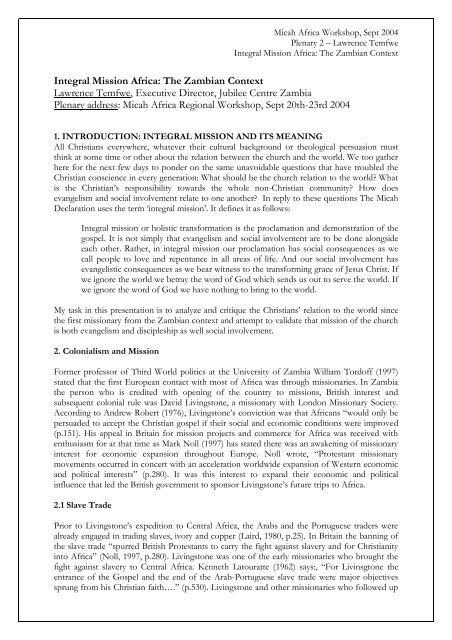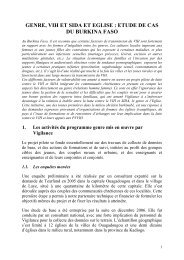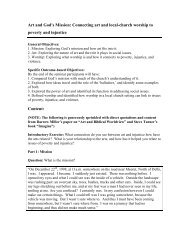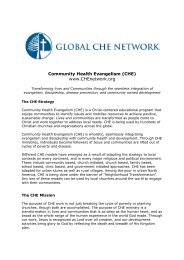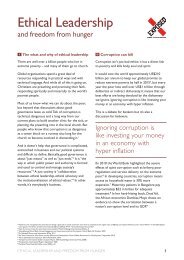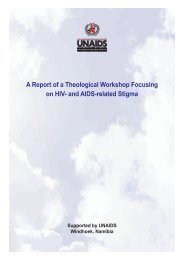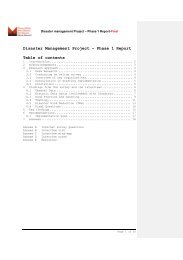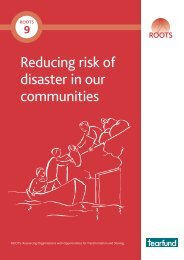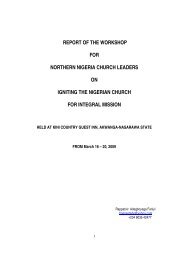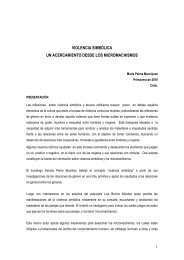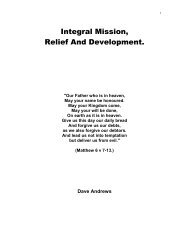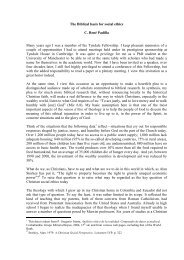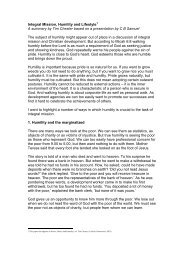Integral Mission Africa: The Zambian Context ... - Micah Network
Integral Mission Africa: The Zambian Context ... - Micah Network
Integral Mission Africa: The Zambian Context ... - Micah Network
- No tags were found...
Create successful ePaper yourself
Turn your PDF publications into a flip-book with our unique Google optimized e-Paper software.
<strong>Micah</strong> <strong>Africa</strong> Workshop, Sept 2004Plenary 2 – Lawrence Temfwe<strong>Integral</strong> <strong>Mission</strong> <strong>Africa</strong>: <strong>The</strong> <strong>Zambian</strong> <strong>Context</strong><strong>Integral</strong> <strong>Mission</strong> <strong>Africa</strong>: <strong>The</strong> <strong>Zambian</strong> <strong>Context</strong>Lawrence Temfwe, Executive Director, Jubilee Centre ZambiaPlenary address: <strong>Micah</strong> <strong>Africa</strong> Regional Workshop, Sept 20th-23rd 20041. INTRODUCTION: INTEGRAL MISSION AND ITS MEANINGAll Christians everywhere, whatever their cultural background or theological persuasion mustthink at some time or other about the relation between the church and the world. We too gatherhere for the next few days to ponder on the same unavoidable questions that have troubled theChristian conscience in every generation: What should be the church relation to the world? Whatis the Christian‟s responsibility towards the whole non-Christian community? How doesevangelism and social involvement relate to one another? In reply to these questions <strong>The</strong> <strong>Micah</strong>Declaration uses the term „integral mission‟. It defines it as follows:<strong>Integral</strong> mission or holistic transformation is the proclamation and demonstration of thegospel. It is not simply that evangelism and social involvement are to be done alongsideeach other. Rather, in integral mission our proclamation has social consequences as wecall people to love and repentance in all areas of life. And our social involvement hasevangelistic consequences as we bear witness to the transforming grace of Jesus Christ. Ifwe ignore the world we betray the word of God which sends us out to serve the world. Ifwe ignore the word of God we have nothing to bring to the world.My task in this presentation is to analyze and critique the Christians‟ relation to the world sincethe first missionary from the <strong>Zambian</strong> context and attempt to validate that mission of the churchis both evangelism and discipleship as well social involvement.2. Colonialism and <strong>Mission</strong>Former professor of Third World politics at the University of Zambia William Tordoff (1997)stated that the first European contact with most of <strong>Africa</strong> was through missionaries. In Zambiathe person who is credited with opening of the country to missions, British interest andsubsequent colonial rule was David Livingstone, a missionary with London <strong>Mission</strong>ary Society.According to Andrew Robert (1976), Livingstone‟s conviction was that <strong>Africa</strong>ns “would only bepersuaded to accept the Christian gospel if their social and economic conditions were improved(p.151). His appeal in Britain for mission projects and commerce for <strong>Africa</strong> was received withenthusiasm for at that time as Mark Noll (1997) has stated there was an awakening of missionaryinterest for economic expansion throughout Europe. Noll wrote, “Protestant missionarymovements occurred in concert with an acceleration worldwide expansion of Western economicand political interests” (p.280). It was this interest to expand their economic and politicalinfluence that led the British government to sponsor Livingstone‟s future trips to <strong>Africa</strong>.2.1 Slave TradePrior to Livingstone‟s expedition to Central <strong>Africa</strong>, the Arabs and the Portuguese traders werealready engaged in trading slaves, ivory and copper (Laird, 1980, p.25). In Britain the banning ofthe slave trade “spurred British Protestants to carry the fight against slavery and for Christianityinto <strong>Africa</strong>” (Noll, 1997, p.280). Livingstone was one of the early missionaries who brought thefight against slavery to Central <strong>Africa</strong>. Kenneth Latouratte (1962) says:, “For Livinsgtone theentrance of the Gospel and the end of the Arab-Portuguese slave trade were major objectivessprung from his Christian faith….” (p.530). Livingstone and other missionaries who followed up
<strong>Micah</strong> <strong>Africa</strong> Workshop, Sept 2004Plenary 2 – Lawrence Temfwe<strong>Integral</strong> <strong>Mission</strong> <strong>Africa</strong>: <strong>The</strong> <strong>Zambian</strong> <strong>Context</strong>later sought to promote what they deemed legitimate trade in order to combat slave trade. Mosttribes were engaged in slave trade for it was the most profitable business. In addition to otherfactors wars were fueled by the desire to capture slaves and to sale them to the Arabs.Zambia historian Henry Meebelo (1971) has traced the beginning of colonial rule to the desire ofthe weaker tribes for protection against stronger tribes. Meebelo points out that, “<strong>The</strong>re washardly any occasion when they (missionaries) established a mission station by force of arms.”(p.27). Meebelo shares that when missionary David Jones opened Fwambo <strong>Mission</strong> in 1887 thelocal people welcomed him. However, they made it clear that they would not listen to hissermons or work with or for him until he had built a stockade around the station anddemonstrated his ability to protect them against another tribe and the Arab raids (p.27) (justice isnot done in full when we accuse only the whites about slave trade without pointing a finger at ourancestors and Arabs sins).<strong>The</strong>refore, to a large extent the desire to trade and the fear of raids from strong tribes and Arabsdid render an easy entry for missionaries into weaker tribal territories. Since the missionariescould find adequate protection, they facilitated the contacts of British business people whoultimately provided security in exchange for agricultural and mining rights. This involvement bythe missionaries is the major reason for criticizing them for their „colonizing mission.‟ However, Iagree with professor George Kinoti of University of Nairobi who states that such criticism ismisplaced (1997:72). “<strong>The</strong> Christian pioneers like David Livingstone were “driven by a vision ofcivilized, prosperous and Christian <strong>Africa</strong>,” says Kinoti (p.72). Like each one of us they were notperfect but one thing for sure they were clear about what Jesus had sent them to do, “And Hesent them out to preach the kingdom of God and to heal the sick.” (Luke 9.2). <strong>The</strong>y did notrelegate the establishing of schools, hospitals, engaging in economic activities and protecting theweak nor did they divorce them from the day-to-day mission of the church but saw the socialaction as a manifestation of the proclamation. Our people also demanded from the missionariesto demonstrate the word of God in their deeds.3. <strong>The</strong> Church and Struggle for Independence<strong>The</strong> concurrence of missionary, trading, humanitarian, and political motives possessed aninnocence that was later lost as missionary efforts become more and more difficult to disengagefrom colonial intent. As <strong>Africa</strong>n Christians learned about democratic administration in theirpositions as elders of the local church they began to see into the very heart of the democraticsystem –the right of legitimate opposition to the ruling power (Morris, 1962, p.17). And as theybecome more politically conscious they found themselves confronting the combination ofgovernment and missionary power, both of which perceived their opposition as a threat to thewhite settlers‟ existence. <strong>The</strong> <strong>Africa</strong>n Christians had initially looked to the missionaries and thechurch to back them when they began to fight for equal rights, but the church stalled. KennethKaunda the first President of Zambia and a Christian who was raised up and educated at amission station stated:I can see that even in the late afternoon of the colonial day it took a very far-sightedmissionary to imagine a near future in which <strong>Africa</strong>ns ruled modern nations throughoutthe continent, let alone agree that Christian gospel could be the accelerator of a politicalindependence and not its brakes. (1981:16)<strong>The</strong> missionary Christian church which led several of the <strong>Africa</strong>n future leaders to Christ andgave them education and taught them about the Christ who had come “to set at liberty thosewho are oppressed, to proclaim the acceptable year of the Lord” (Luke 4:18-19) betrayed theword of God which sent them out to serve the people. <strong>The</strong> consequences were catastrophicchurchleaders left the church and become freedom fighters (Marxists). Christianity was seen as
<strong>Micah</strong> <strong>Africa</strong> Workshop, Sept 2004Plenary 2 – Lawrence Temfwe<strong>Integral</strong> <strong>Mission</strong> <strong>Africa</strong>: <strong>The</strong> <strong>Zambian</strong> <strong>Context</strong>white man religion and it failed to attract the intellectuals. By the time <strong>Africa</strong>ns got theirindependence the church was seen as being irrelevant to the political, social and economicinspiration of the people. Remember Nkwame Kurumah‟s statement, “Seek he first the politicalfreedom and everything else shall be added to you”.4. Post Democracy <strong>Africa</strong> and <strong>Integral</strong> <strong>Mission</strong>Except for Nigeria and a few other countries, the majority of sub-Saharan <strong>Africa</strong>n Christianchurches and groups in their countries enjoy unlimited freedom in their expression of worship,evangelism and in engaging their governments in issues relating to social, political and economicssince the advent of democracy in early 90‟s. In addition several presidents in the sub-Saharan<strong>Africa</strong> confess to be Christians. Another phenomenon the church is enjoying as a result ofdemocratization is the increasing number of short-term mission workers from the Northespecially from the USA visiting <strong>Africa</strong> to partner with local churches in evangelism, churchplanting and social action. <strong>The</strong> population of people being added to the church and the numberof churches being planted is also very impressive.Sadly sub-Saharan <strong>Africa</strong> is bleeding. Of the 14 million orphans left behind as a result of AIDS,80% (11million) live in sub-Saharan <strong>Africa</strong>. Zambia has 570,000, Kenya has 890,000, Zimbabwehas 780,000 and Nigeria has 1 million (avert.org/aidsorphans). Unemployment rates in several ofthese countries are from 37% to 80%. Although the figures for brain drain are very scanty,sources indicate that the figures for immigrant scholars, professionals and stay-ons is very highcompared to the small critical mass of its trained and qualified scholars. Running Water andsanitation systems are either chaotic or non-existent. HIV/AIDS, malaria and other preventablediseases are killing our people in thousands every year. Poverty is a household name in ournations. When you consider success stories in East Asia of which some were poorer than sub-Saharan <strong>Africa</strong>n countries we must ask the question like Tony Blair is asking, “Why are we theonly continent going backward?”4.1 <strong>Context</strong> of our <strong>Mission</strong> FieldRecently a high ranking government official in Zambia who is also a minister of the gospel statedin a newspaper that, “in his 22 years experience as a preacher, he had no time to greet and touchthe people who were poor.” If 80% of our people are poor in our nation to whom then was hepreaching? Paul Hiebert (1994) has intimated that churches in every culture have the right andresponsibility to read and interpret the Scriptures in their own historical and cultural context(p.58). He warned however of the dangers of being uncritical about one‟s own goodness in one‟sculture: “In the end contexualization often becomes an uncritical process in which good in othercultures is affirmed, but the evil in them was left unchallenged.” <strong>The</strong> suffering and misery of ourpeople in sub-Saharan <strong>Africa</strong> has provided the foundation for the contexualization of Christianitythat appropriately responds to the spiritual, social and economic needs of our people. Let meshare some points that I think we need to be challenging if we believe in integral mission:4.1.1 A version of prosperity gospel<strong>The</strong> preaching of the gospel that puts emphasis on certain kind of worldly blessings - car, cellphone,cash, house and expensive clothes has alienated over 70% of our people who live inabject poverty in nations like Zambia, Malawi and Zimbabwe (let alone the theological problems).This gospel plants churches in locations where people who can adequately provide for the„servant of God‟ live. This gospel fails to appreciate that the prevailing socio-political uncertainty,the sluggish state of our economy and the unspeakable inequities are because of leaders who havebeen more interested in pursuing their own narrow and selfish interests than in promoting thewelfare of the majority of our people.
<strong>Micah</strong> <strong>Africa</strong> Workshop, Sept 2004Plenary 2 – Lawrence Temfwe<strong>Integral</strong> <strong>Mission</strong> <strong>Africa</strong>: <strong>The</strong> <strong>Zambian</strong> <strong>Context</strong>4.1.2 Hierarchy and excessive controlPeople in <strong>Africa</strong> are over-managed and under led. <strong>The</strong>y have lost hope for a better <strong>Africa</strong>. <strong>The</strong>grassroots are passive, resigned and cowardly. Daniel Etounga-Manguelle (2000) says, “<strong>The</strong> entiresocial body accepts, as a natural fact, the servitude imposed by the strong man of the moment.<strong>The</strong> children of Israel were the same at the time Moses took them out of Egypt. It took them amatter of days to come out of Egypt but it took forty years to take Egypt out of their mind. Weneed leadership that has been at the mountaintop with God and have seen what it can be. Aleadership committed to serve people not to lord it over them. We must confront the „father ofnation, church and city‟ syndrome. We must encourage the priesthood of all believers and helppeople to work to their own future.4.1.2 Fatalistic AttitudeTeaching in a community about the dangers of AIDS a few years back I heard this response fromone of the elderly people in the community, “AIDS came for people. If do not die from it we willstill die from malaria or hunger. This is the will of God - there is nothing you can do about it.”Famines, illness, infertility are all attributed to supernatural forces that are beyond human control.<strong>The</strong> church which should be challenging people to work hard if they want to eat instead asksthem to give a „seed‟ that curse of poverty can be broken through a ritual of prayer.<strong>The</strong>re are many fine elements in traditional <strong>Africa</strong>n culture. <strong>The</strong>se include strong family ties,generosity and a strong community spirit. <strong>The</strong>se must be affirmed in our preaching and teaching.But we must not be afraid to confront the evils in our culture. At one time Peter wasdisillusioned and said to Jesus we have left all to follow you (is eternal life all).Jesus answered him, “Everyone who has given up house or wife …for the sake of the Kingdomof God, will be repaid many times in this life, as well as receiving eternal life in the life to come”(Luke 18:29-30). In John 10:10 Jesus says, “I have come that they may have life, and have it tothe full.” Jesus is concerned about every aspect of our lives and he commands all his followerswith the whole person as well. For Jesus, evangelism and social involvement are not held intension against each other in his ministry, but has an integral approach, treating people as humanbeings by responding to their spiritual and material need. We should do no less.Conclusion<strong>The</strong> story of Christianity in <strong>Africa</strong> is integral to colonialism. <strong>The</strong> history of commerce andcivilization in <strong>Africa</strong> is also not complete without Christianity. <strong>Africa</strong>n freedom fighters rejectedthe gospel because it prepared the <strong>Africa</strong>n for heavenly bliss and not earthly blessings. Today thepreaching has changed. We have a gospel that demands instant accumulation of wealth withoutappreciating the context in which that gospel is being preached. Until we begin to preach themessage of salvation that puts things right and reverses the effects of sin, bringing healing at alllevels: individual, societal and political, the church is again in danger of having this gospel beingrejected by the street kids, orphans etc from which future presidents of our countries will come.
<strong>Micah</strong> <strong>Africa</strong> Workshop, Sept 2004Plenary 2 – Lawrence Temfwe<strong>Integral</strong> <strong>Mission</strong> <strong>Africa</strong>: <strong>The</strong> <strong>Zambian</strong> <strong>Context</strong>5. Recommendation<strong>The</strong> church in sub-Saharan <strong>Africa</strong> has played significant role in the political developments thatare shaping our nations. This role however, has been rather reactionary than proactive. Andbecause of this we have seen little results of our efforts at various social and economical frontsdespite our nations claiming unprecedented numerical growth. We need to be proactive in oursocial involvement. Here are my recommendations toward that goal1. <strong>Micah</strong> Challenge begins to create a bridge between the Western and the <strong>Africa</strong>nChristians, which promote mutual respect, accountability and partnership in proclaimingthe gospel to the unreached people and in making a meaningful contribution to the<strong>Africa</strong>n desire for godly social peace and economical sufficiency.2. <strong>Micah</strong> <strong>Network</strong> members in each country conduct a national consultative meeting forchurch bishops and leading churches with membership of 2,000 and above on theMDGs. <strong>The</strong> purpose is to give information to bishops on the state of nation in light ofthe MDGs and to ask bishops to give access to the <strong>Network</strong> to their members - scholars,professionals, business people willing to join the <strong>Network</strong>.3. <strong>Micah</strong> Challenge creates an information centre that keeps <strong>Network</strong> members informedon burning issues and recommends possible action wherever possible.4. <strong>Network</strong>s in each nation meet after the Bishops conference to strategize for the nextthree years.BIBLIOGRAPHYHall, Richard. (1976) Zambia 1890-1964 <strong>The</strong> Colonial Period. London: Pall MallHatch, John (1976). Two <strong>Africa</strong>n States Men. Chicago: Henry Regnry.Hiebert, G. Paul. (1994) Anthropological Reflections Missiological Issues. Grand Rapids: BakerHouseKaunda, Kenneth. (1962). Zambia Shall be Free. New York: Frederick A. Praeger.Kinoti, George. (1997) Hope for <strong>Africa</strong>. Bible Society NairobiLaird, Doris. Marley. (1980). Collin Morris: Modern <strong>Mission</strong>ary. Ann Arbor. U.M.I.Latourette, Kenneth. (1962). <strong>The</strong> Twentieth Century Outside Europe. New York: Harper andRowMeebelo, Henry. (1971). Reaction to Colonialism. Manchester: Manchester University.Morris, Collin. (1962). <strong>The</strong> end of the <strong>Mission</strong>ary. London: Cargate Press_________. (1963). Nationalism in <strong>Africa</strong>. London: Edinburgh House Press_________. (1963). Nothing to Defend. London: Cargate PressNoll, A. Mark. (1988). One Nation Under God? Christian Faith & Political Action in America.New York: Harper and Row.Noll, A. Mark. (1998) Turning Points. Grand Rapids: Baker House.Roberts, Andrew (1976) A History of Zambia. New York: Holmes & Meir.Rotburg, I. Robert. (1971). <strong>The</strong> Rise of Nationalism in Central <strong>Africa</strong>. <strong>The</strong> Making of Malawiand Zambia. Massachusetts: Harvard University.Tordoff, William (ed.). (1974). Politics in Zambia. Berkeley: University of California.Tordoff, William. (1997). Government and Politics in <strong>Africa</strong>. Indiana: Indiana University Press.


